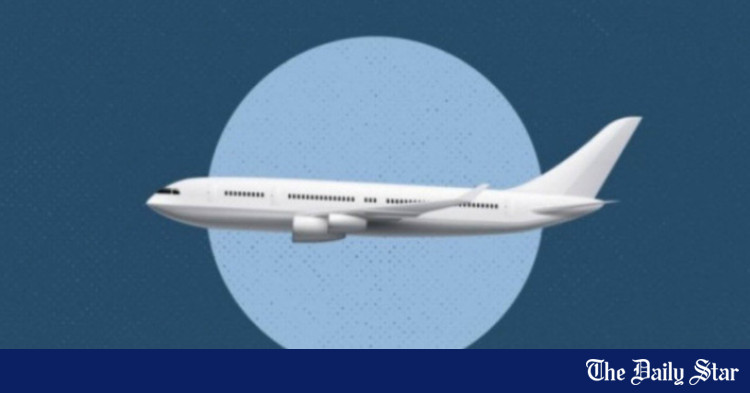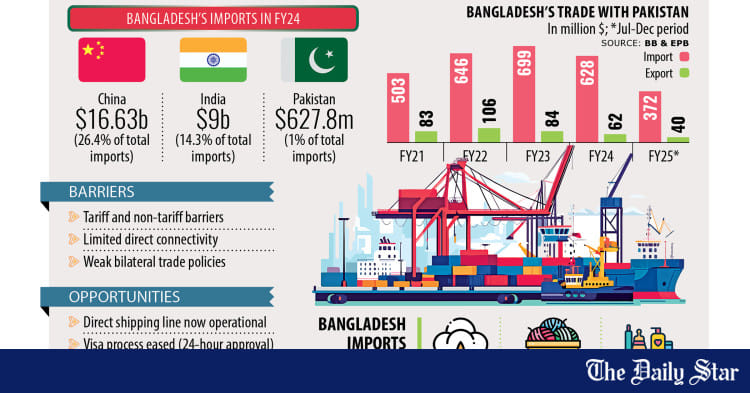Saif
Senior Member
- Joined
- Jan 24, 2024
- Messages
- 15,397
- Reaction score
- 7,874
- Nation

- Residence

- Axis Group


Pakistan PM wishes quick recovery of Khaleda
Describing BNP chairperson Begum Khaleda Zia as a towering figure in Bangladesh’s political landscape, Pakistan Prime Minister Shehbaz Sharif has extended his best wishes for a swift and complete recovery of the former Bangladesh Prime Minister. "I am perturbed to learn about your health iss
Pakistan PM wishes quick recovery of Khaleda
UNB
Published :
Feb 02, 2025 20:59
Updated :
Feb 02, 2025 20:59

Describing BNP chairperson Begum Khaleda Zia as a towering figure in Bangladesh’s political landscape, Pakistan Prime Minister Shehbaz Sharif has extended his best wishes for a swift and complete recovery of the former Bangladesh Prime Minister.
"I am perturbed to learn about your health issues and wish to convey my best wishes for your swift and complete recovery,” said PM Sharif in an official letter addressed to the BNP leader.
He acknowledged Khaleda Zia’s significant contributions to Bangladesh's politics. “You have been a towering figure in the political landscape of Bangladesh. Your unwavering dedication to public service remains an inspiration to many,” he wrote in the letter dated January 31.
The Pakistan PM prayed for her good health and well-being. “Our thoughts are with you, your family, and your supporters during this period. May Allah the Almighty protect you from all ailments and grant you good health,” he said.
BNP media cell member Sayrul Kabir Khan confirmed the letter on Sunday.
The three-time former prime minister, Khaleda Zia, has long been suffering from liver cirrhosis, kidney and heart issues, diabetes, and arthritis.
She left Dhaka for London in early January aboard a special air ambulance sent by the Emir of Qatar to receive advanced treatment at the London Clinic.
The 79-year-old, Khaleda Zia, was admitted to the London Clinic on January 8 and discharged from the clinic on January 25. Since then she has continued her medical treatment at her son Tarique Rahman's residence under the supervision of Professor John Patrick Kennedy and Professor Jennifer Cross, both of whom have been overseeing her care at the clinic.
UNB
Published :
Feb 02, 2025 20:59
Updated :
Feb 02, 2025 20:59
Describing BNP chairperson Begum Khaleda Zia as a towering figure in Bangladesh’s political landscape, Pakistan Prime Minister Shehbaz Sharif has extended his best wishes for a swift and complete recovery of the former Bangladesh Prime Minister.
"I am perturbed to learn about your health issues and wish to convey my best wishes for your swift and complete recovery,” said PM Sharif in an official letter addressed to the BNP leader.
He acknowledged Khaleda Zia’s significant contributions to Bangladesh's politics. “You have been a towering figure in the political landscape of Bangladesh. Your unwavering dedication to public service remains an inspiration to many,” he wrote in the letter dated January 31.
The Pakistan PM prayed for her good health and well-being. “Our thoughts are with you, your family, and your supporters during this period. May Allah the Almighty protect you from all ailments and grant you good health,” he said.
BNP media cell member Sayrul Kabir Khan confirmed the letter on Sunday.
The three-time former prime minister, Khaleda Zia, has long been suffering from liver cirrhosis, kidney and heart issues, diabetes, and arthritis.
She left Dhaka for London in early January aboard a special air ambulance sent by the Emir of Qatar to receive advanced treatment at the London Clinic.
The 79-year-old, Khaleda Zia, was admitted to the London Clinic on January 8 and discharged from the clinic on January 25. Since then she has continued her medical treatment at her son Tarique Rahman's residence under the supervision of Professor John Patrick Kennedy and Professor Jennifer Cross, both of whom have been overseeing her care at the clinic.



















